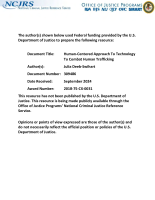Reassessing the Breadth of the Protective Benefit of Immigrant Neighborhoods: A Multilevel Analysis of Violence Risk by Race, Ethnicity, and Labor Market Stratification
Journal
Criminology
Date Published
2018
Agencies
NIJ-Sponsored
Publication Type
Research (Applied/Empirical)




